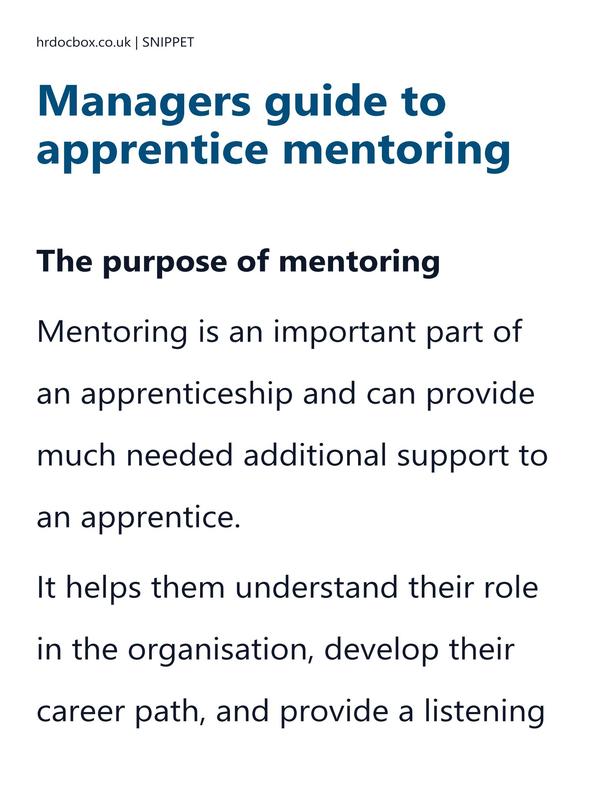Managers guide to apprentice mentoring


This guide looks at the value of mentoring an apprentice, the mentor role and responsibilities, and who might make a suitable mentor.
- Includes Managers guide to apprentice mentoring, plus 12 months’ access with all updates provided free of charge and notified to you.
- UK-specific accuracy.
- 666 words over 2 pages.
- Last updated 19/01/2026.
- Format: Word / PDF / plain text / email.
- Delivery: Instant download after purchase (no physical item).
- Access: Download link shown here after checkout.
- This Managers guide to apprentice mentoring will SAVE you up to 1 hour 30 mins research. Save cost. Reduce risk.
Managers guide to apprentice mentoring
The purpose of mentoring
Mentoring is an important part of an apprenticeship and can provide much needed additional support to an apprentice.
It helps them understand their role in the organisation, develop their career path, and provide a listening ear if they’re facing any problems and challenges.
Mentoring helps people to learn and develop. Mentoring therefore has the potential to make a valuable contribution to apprentices in terms of their personal and professional development and to the overall development of the organisation.
Benefits for the apprentice can include:
-
Increased confidence/self-esteem.
-
Increased sense of value within the organisation.
-
Additional help and support.
-
Safe learning environment (can be open about vulnerabilities).
-
Increased understanding of the organisation.
-
Focus on specific skills through coaching from the mentor.
-
Ideas about career opportunities.
The benefits are not all one way. Mentors too can gain a sense of value within the organisation as well as satisfaction from passing on their skills and wisdom; also, greater understanding of the organisation and its issues and problems, as well as improving one-to-one communication skills, coaching skills and management skills.
Role of a mentor
Mentoring is particularly important
This is a 30% preview of the Managers guide to apprentice mentoring. For instant full access, purchase this item or a parent bundle.
Managers guide to apprentice mentoring purpose
A guide to apprentice mentoring is a document that provides a structured framework and guidelines for mentors and apprentices to follow during an apprenticeship program. It helps to establish clear expectations, build a strong relationship, create a learning plan, provide feedback, encourage self-reflection, support growth opportunities, and maintain a connection even after the program ends.
The purpose of the guide is to ensure consistency and effectiveness in the apprenticeship program.
Compliance
Compliance
This Managers guide to apprentice mentoring incorporates relevant UK laws and HR standards, including those listed below:
-
Establish clear expectations: From the beginning, set clear expectations for both the mentor and the apprentice. This can include the goals of the apprenticeship, the timeline, the roles and responsibilities of both parties, and the desired outcomes.
-
Build a strong relationship: A successful mentoring relationship is built on mutual trust, respect, and communication. Take time to get to know your apprentice, their interests, strengths, and weaknesses. Find common ground and build a connection.
-
Create a learning plan: Work with the apprentice to create a learning plan that outlines what skills they need to acquire, what experiences they should have, and what resources they will need to be successful. Be sure to set measurable goals and regularly review progress.
-
Provide feedback: Feedback is essential for growth and development. Be sure to provide specific, constructive feedback regularly. Celebrate successes and provide guidance on areas for improvement.
-
Encourage self-reflection: Encourage your apprentice to reflect on their experiences, both successes and challenges. Help them identify areas where they can improve and develop a plan to address them.
-
Support growth opportunities: Look for opportunities for your apprentice to learn and grow, both within and outside of the apprenticeship program. Provide resources, connections, and guidance as needed.
-
Stay connected: Stay in regular communication with your apprentice, even after the program ends. Maintain a connection and provide ongoing support as they continue to grow and develop in their career.
Remember that every mentoring relationship is unique, and there is no one-size-fits-all approach. Be flexible and adapt to the needs of your apprentice as you work together towards their development and growth.
Frequently Asked Questions about a Managers guide to apprentice mentoring
Frequently Asked Questions about a Managers guide to apprentice mentoring
-
Can I use the Managers guide to apprentice mentoring in my small business?
Yes. The Managers guide to apprentice mentoring is designed to be flexible and suitable for organisations of all sizes, including small businesses and charities. It follows UK employment law best practice, so even if you don't have an in-house HR team, you can confidently apply it.
-
Is the Managers guide to apprentice mentoring compliant with 2026 UK employment law?
Absolutely. Like the Managers guide to apprentice mentoring, all of our templates are drafted with the latest ACAS guidance and UK employment legislation in mind. We review and update them regularly, so you can be confident they remain compliant.
-
Can I customise the Managers guide to apprentice mentoring for my organisation?
Yes, we highlight the areas of the Managers guide to apprentice mentoring that you need to update with your own details, and where you need to make decisions to suit your situation. This saves you time and ensures that you meet best practice.
-
Do I get instant access to the Managers guide to apprentice mentoring?
Yes. Once purchased, you'll be able to download the Managers guide to apprentice mentoring instantly. Templates are provided in editable Word or Excel format so you can customise them easily, and in PDF format for easy sharing.
-
What if I need more help, not just a Managers guide to apprentice mentoring?
If you're looking for broader support, we also offer toolkits and library bundles that include the Managers guide to apprentice mentoring, along with other HR templates and policies for fully managing your situation. These may be more cost-effective if you need deeper advice.
-
Why should I use this Managers guide to apprentice mentoring, and not AI to generate it?
The risk of using a free AI-generated template 'without review' includes your legal exposure, missing context, and no awareness of the wider process, whereas purchasing the Managers guide to apprentice mentoring from us mitigates that risk.
